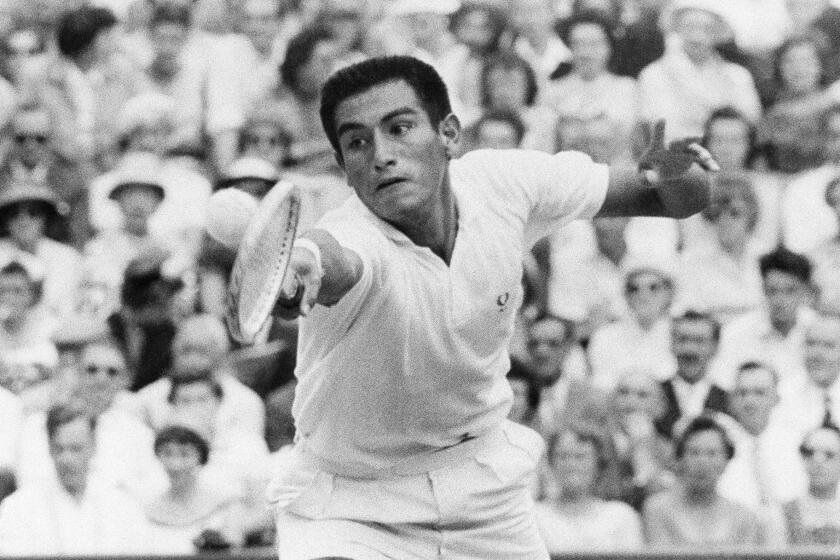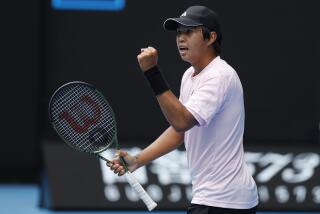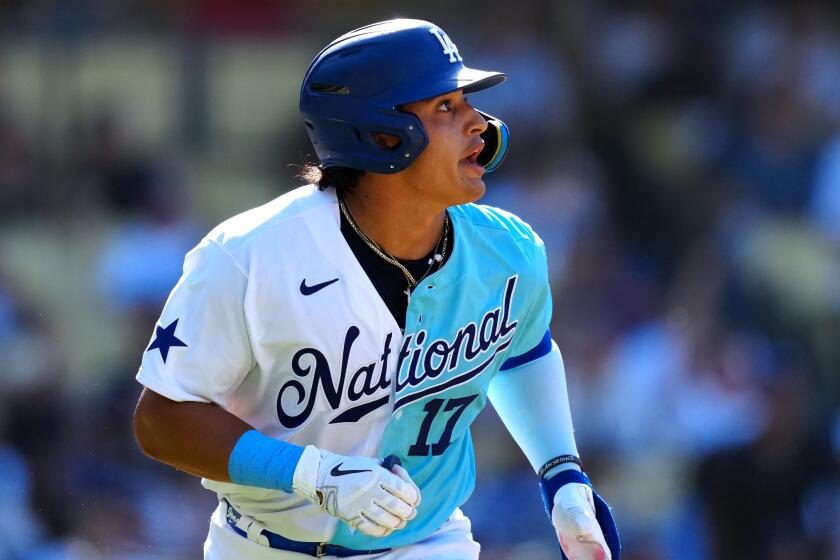Column: Coronavirus pandemic has not hurt Brandon Nakashima’s tennis skills
Brandon Nakashima’s future began to take shape long before he could hold a tennis racket or knew what a Grand Slam tournament was.
The 19-year-old San Diego native, whose world ranking hit a career-best 166 after he earned his first Challenger Tour title in November, showed an aptitude for sports from a young age. His parents, Christina and Wesley — both pharmacists — were struck by their toddler’s exceptional hand-eye coordination.
“I remember that during a party for his third birthday we had several fun activities for the kids. One activity was to shoot free throws into a miniature basketball hoop. Brandon managed to get a few balls to drop in while many kids struggled to find the backboard,” Christina said via email.
Christina, who was born in Vietnam and immigrated to the United States when she was 5, played tennis through high school. At the urging of her brother, Bill, who had played tennis at UC Santa Barbara, she and Wesley supported Brandon’s sports activities.
When he was 3, they let their son hit nerf tennis balls in their living room with Christina’s father, retired Air Force Lt. Colonel Anh Pham. When Brandon was 4, they took him to hit at a tennis court in Carmel Valley. “My husband and I saw that he could focus and stay with the same activity longer than most kids and kept encouraging him to improve his athletic skills,” Christina Nakashima said.
Brandon is still precocious. He turned pro in 2019 after one year at the University of Virginia and reached the quarterfinals at Delray Beach, Fla., earlier this year as a wild-card entry in his Assn. of Tennis Professionals tour debut. He recorded his first Grand Slam match victory with a first-round win at the U.S. Open before he lost to eventual runner-up Sascha Zverev in four sets.
He’s the youngest American man in the year-end top 200, having moved up from 367 at the end of 2019, a remarkable climb during a year in which COVID-19 turned the world upside down and wiped out much of the pro tennis schedule. His game is evolving nicely. He has a potent backhand, a strategically sound return game and an improving serve. His poise on the court, another distinct asset, allows him to stay focused. As he matures he can add power and muscle. He’s already someone to watch in the seemingly endless search for the next standout American male tennis player.
No American man has won a Grand Slam event since 2003, when Andre Agassi won the Australian Open and Andy Roddick won the U.S. Open. The top-ranked American man is No. 25 John Isner, who is 35 years old.
It’s a long way from 166 to tennis’ highest perch but Nakashima is determined to continue climbing.
“I’m always trying to improve my game to compete with those top guys, and I think I can be top in the world one day. It’s a matter of putting in the hard work and competing well in the tournaments, doing well in those,” he said in a recent phone conversation.
“I try not to think too much about the rankings at this point. I just try to focus on developing my game. I know if I do that the results will come and the ranking will improve. I think it’s just a matter of feeling confident right now and progressing in a positive direction.”
His straight-sets victory over Prajnesh Gunneswaran in the Challenger event in Orlando, Fla., was a milestone and affirmation. “It was a great week for me. It definitely showed that I was improving in the right direction after all this time off,” Nakashima said.
He played in some UTR pro events while he waited for tennis to safely resume but he mainly has been training in San Diego. “It’s always tough, especially this year, to improve your ranking given there wasn’t so many tournaments like in a normal calendar year. I think it’s just taking advantage of the opportunities when they’re given to you,” he said.
“During that whole time off, when there was no tournaments, I was still training hard and working on my game to try to improve. Once the tournaments started back up again in August, like everybody, I was excited and I was eager to play some competitive matches and just taking advantage of the opportunities when we’re ready to play. I’m just thankful to all the people that organized the tournaments to have us be able to play them.”
His prize money at the U.S. Open was $100,000, but that kind of payday is rare. He got $7,200 for winning the Challenger Event; his winnings didn’t reach four figures on several other occasions. He has clothing and racket deals but those don’t make him rich. “I do have local friends that are willing to sponsor small travel expenses and coaching expenses so I’m extremely thankful for all that and their help to help me in my game and in this journey, so to say,” he said.
“It definitely it is tough coming up, financially speaking. I mean especially in these lower-level tournaments, like the Challengers, you’re not making enough to make a living out of yourself. ... I think financially speaking it’s always going to be tough because you’re always going to have to have coaches with you, fitness trainers, physios traveling with you all the time. But as long as you’re improving your tennis game and heading in the right direction, it can all work out.”
Olmedo won NCAA championships in singles and doubles for the Trojans.
Nakashima worked with coach Pat Cash for eight months but he’s now coached by Dusan Vemic, a former member of Novak Djokovic’s team. Nakashima said Vemic mentions Djokovic often. “I think partly because my game is pretty similar stylewise to him,” Nakashima said. “He obviously has learned a lot from traveling with Djokovic and coaching him so I think that definitely helps him become a better coach for any player.”
Thanks to Vemic, Nakashima practiced with World No. 1 Djokovic every day for a week during the U.S. Open. “Any time when you can play against or practice with any of the top guys you’re just really thankful for it and take full advantage of it,” Nakashima said.
If he continues on his current path, Nakashima and Djokovic will face each other with more at stake than practice bragging rights. “My family as well as his long-time coaches are very excited for Brandon to embark on this journey,” Christina Nakashima said. “We are all very proud of him and can’t wait to see what the future holds for Brandon.”
Boosters of American tennis should feel the same way.
More to Read
Go beyond the scoreboard
Get the latest on L.A.'s teams in the daily Sports Report newsletter.
You may occasionally receive promotional content from the Los Angeles Times.












